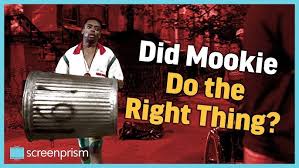
I was not a fan of Spike Lee’s movies, including Do the Right Thing, which had its debut in 1989 when I was 23. I must attribute it to ignorance, having been conditioned to have a particular view of the world which I am not proud of. I was living in Dallas, Texas working in my parents’ retail business and just partying through my youth. I believed the country to be a fair place with equal chances for everyone and where you could change your lot in life if you just worked harder. Looking back after I watched it again, I can honestly say the best part of my thinking then was synonymous with the statement “Ignorance is Bliss”, which helps me not be so ashamed.
Our world is rife with social conflict, racial tension, and ethical ambiguity along with many other issues, so what does it mean to act virtuously? Do the Right Thing drives viewers to confront a reality that is difficult to fathom, where doing “the right thing” becomes an almost impossible task. Aristotle’s Virtue Theory preaches cultivating good character and moral habits, in the zone where virtuous actions are found between extremes. Blending Dussel’s Liberation Ethics, helps us tie together the ideas of Virtue Theory to Spike Lee’s Do the Right Thing by telling us to provide a voice to the disenfranchised.
At 00:47 in the video Aristotle & Virtue the Crash Course Philosophy #38 “Aristotle and other virtue theorists reasoned that, if we can just focus on being good people, the right actions will follow, effortlessly.” He further states that we should hit the mean between two extremes like with courage which could be defined as the mean between cowardice and recklessness (4:02). This framework works well in a vacuum, but in Do the Right Thing, it is an impossible path to walk in the face of systemic racism, injustice and senseless violence. How do we find the virtuous medium and speak for the marginalized majority in this world where societal structures are deeply unjust?
Spike Lee plays Mookie who tries to navigate his life virtuously in an unforgiving environment constantly brewing with this tension. Throughout the film he tries to do the right thing keeping his cool a prime example of this is his dealings with Pino, who might be called MAGA today. Pino goads him throughout the film and Lee’s character with racial epitaphs which builds the pressure in the little teapot that is Mookie. The teapot finally bursts at the film’s climax, when Mookie launches a trash can through the pizza shop’s window after the police murder Radio Raheem. This brings to a head the conflux of institutional racism, social injustice and violence spurring a riot and the destruction of Sal’s livelihood. Is this the “right thing”? Registering my thoughts on what I believe Dussel would say about Do the Right Thing, leads me to say Mookie’s action begin to looks more like a response to a justice call from the disenfranchised.
Do the Right Thing emboldens us to look at a world of systemic injustice through a lens of Virtue Theory. Aristotle’s writing offers valuable insights into moral development on an individual basis. Dussel’s emphasis on the marginalized reframes the “right thing” as an act of resistance within the context of the many. Mookie’s actions, represent the moral complexities of acting virtuously in a world where oppression is the norm.
Thank you so much for weaving in Dussel along with Aristotle in your in-depth look at Spike Lee’s classic film. I appreciate the richness of your perspective. And your honesty. You recognize a time when “the best part of my thinking then was synonymous with the statement “Ignorance is Bliss” — and now, presented with the breadth of new perspectives, you see things much differently.
Did Mookie do the right thing? Your answer synthesizes Western individualism (Aristotle) with appreciation for an “act of resistance within the context of the many” (Dussel). Exemplary conclusion, this:
“Mookie’s actions, represent the moral complexities of acting virtuously in a world where oppression is the norm.”
Excellent work. All the gratitude for your thinking and writing.
Deidre
Hi Marc,
Wonderful insights and thoughtful introspections this week. I appreciate that you are able to be flexible with your beliefs, taking in new information and forming new opinions when presented with information that may conflict with preconceptions; this is difficult for a lot of people to do. I agree that the character of Mookie served well to represent “the moral complexities of acting virtuously in a world where oppression is the norm”. Moral development is not as simple as practicing virtues, especially if we do not have the support or social structures needed to enable us to practice the habits that one would call “virtuous”. Thanks for your thoughts on this subject, it made for a good read.
Hi Marc,
I think it’s great that after watching the film again, you gained a whole new perspective on the film. I like how you connected the film with both Aristotle’s Virtue Theory and Dussel’s Liberation Ethics. Mookie’s actions driven by frustration and a call for justice highlighted the difficulties of finding a virtuous path while living in such a complex world. Both of these philosophies really show how acting virtuously often involves navigating moral ambiguities and advocating for the marginalized.